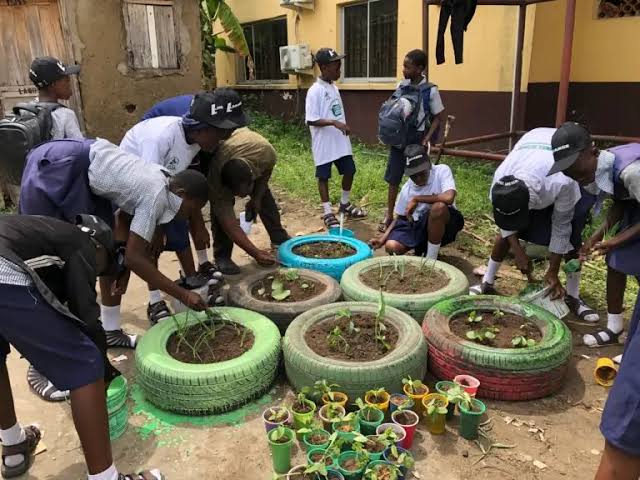Explore how education influences environmental sustainability in Nigeria, from raising awareness and shaping policies to community engagement and practical applications. Learn about the challenges and opportunities in leveraging education to address Nigeria's environmental issues and promote a sustainable future.
.Education plays pivotal role in shaping future of environmental sustainability particularly in countries like Nigeria, where environmental challenges are increasingly pressing. By instilling knowledge values and skills related to environmental conservation. Education can drive significant changes in attitudes and behaviors toward environment. This comprehensive exploration delves into how education impacts environmental sustainability in Nigeria. Covering various dimensions such as awareness policy, community involvement and practical applications.
Understanding Environmental Challenges in Nigeria
Nigeria faces range of environmental challenges that impact its sustainability. These include deforestation soil erosion, water pollution climate change and loss of biodiversity. Rapid urbanization and industrialization have exacerbated these issues. Leading to significant environmental degradation. Addressing these challenges requires multifaceted approach. Education is central to fostering culture of environmental stewardship.
The Role of Environmental Education
Environmental education is crucial in raising awareness about environmental issues. It promotes sustainable practices. In Nigeria this education often begins at primary and secondary school levels. Students are introduced to concepts related to environmental conservation. Curricula that incorporate environmental science, ecology and sustainability principles help students understand impact of human activities on environment and importance of protecting natural resources
Integrating environmental education into the school curriculum enables students to gain a deeper understanding of issues such as climate change, pollution, and resource depletion. For instance, learning about the consequences of deforestation can lead to greater appreciation for reforestation efforts and sustainable land management practices. By fostering an early understanding of these concepts, students are better equipped to make informed decisions and advocate for environmental protection.
Influence on Policy and Governance
Education also plays a critical role in shaping environmental policy and governance. As students progress through their educational journeys, they acquire the knowledge and skills necessary to engage in environmental advocacy and policymaking. In Nigeria, higher education institutions, such as universities and research centers, contribute significantly to environmental research and policy development.
Academic programs focused on environmental science, engineering, and sustainable development produce experts who can influence policy decisions and drive innovation in environmental management. Research conducted by these institutions often informs government policies and initiatives aimed at addressing environmental challenges. For example, studies on the effects of climate change on agriculture can lead to the development of policies that promote climate-resilient farming practices.
Community Engagement and Activism
Education empowers individuals to participate in community-based environmental initiatives and activism. In Nigeria, various educational programs and organizations work to engage communities in environmental conservation efforts. School projects, community workshops, and awareness campaigns help to mobilize citizens and foster a sense of collective responsibility for the environment.
Community engagement through education can take many forms, including tree-planting campaigns, waste management programs, and clean-up drives. These initiatives not only address immediate environmental issues but also build long-term habits of environmental stewardship. For instance, students who participate in tree-planting activities may carry these values into adulthood, advocating for reforestation and sustainable land use in their communities.
Practical Applications and Innovations
Educational institutions in Nigeria often serve as hubs for practical applications and innovations in environmental sustainability. Schools and universities may collaborate with government agencies, non-governmental organizations, and private sector partners to implement projects that address local environmental issues. These projects can include the development of sustainable agriculture practices, renewable energy solutions, and water conservation techniques.
By providing students with hands-on experience in these areas, education fosters a deeper understanding of how theoretical concepts apply to real-world challenges. For example, students engaged in projects focused on sustainable agriculture can learn about soil health, crop rotation, and organic farming techniques. These practical skills not only enhance their academic knowledge but also prepare them for careers in environmental management and sustainable development.
Challenges and Opportunities
Despite the significant impact of education on environmental sustainability, there are challenges to effectively implementing environmental education in Nigeria. Limited resources, inadequate infrastructure, and a lack of trained educators can hinder the delivery of comprehensive environmental education programs. Additionally, there may be gaps in integrating environmental education into the broader curriculum, leading to inconsistencies in how these topics are covered.
Addressing these challenges requires a collaborative approach involving government agencies, educational institutions, non-governmental organizations, and the private sector. Investing in teacher training, developing resource materials, and establishing partnerships can enhance the effectiveness of environmental education programs. Additionally, leveraging technology and digital tools can help overcome some of the limitations associated with traditional education methods.
The Role of Government and Policy Makers
Government support and policy frameworks are essential for advancing environmental education and sustainability efforts. In Nigeria, policies that promote environmental education in schools, provide funding for research, and support community-based initiatives are crucial for fostering a culture of sustainability. Policymakers play a key role in setting priorities, allocating resources, and ensuring that environmental education is integrated into national and local education systems.
For instance, policies that mandate the inclusion of environmental education in school curricula can ensure that students across the country receive consistent and comprehensive training on environmental issues. Additionally, government support for research and innovation can drive advancements in sustainable technologies and practices, benefiting both the environment and the economy.
Conclusion
Education has a profound impact on environmental sustainability in Nigeria by raising awareness, shaping policies, engaging communities, and fostering practical skills. As the country continues to confront significant environmental challenges, the role of education in promoting sustainable practices and driving positive change becomes increasingly important. By addressing the challenges and leveraging opportunities, Nigeria can harness the power of education to build a more sustainable future for its people and its environment.
